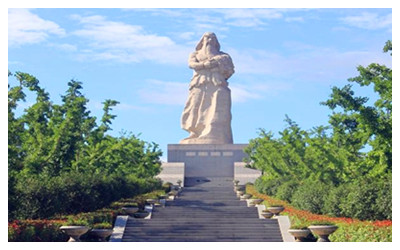Skype: neodalle-travel
Tel: +86 135 7447 2266
E-mail: sales@visitaroundchina.com

 Suizhou Emperor Yan Shennong Native Place Scenic Area is located in the northwest of Hubei province, 160 kilometers away from Wuhan city. According to historical records, it is the birthplace of Emperor Yan, the first ancestor of the Chinese people. It is also the only way to pass to go to Longzhong of the ancient Three Kingdoms, and Wudang Mountain, the Taoism Holy Land. It is a significant spot of eco-cultural tourism in western Hubei province.
Suizhou Emperor Yan Shennong Native Place Scenic Area is located in the northwest of Hubei province, 160 kilometers away from Wuhan city. According to historical records, it is the birthplace of Emperor Yan, the first ancestor of the Chinese people. It is also the only way to pass to go to Longzhong of the ancient Three Kingdoms, and Wudang Mountain, the Taoism Holy Land. It is a significant spot of eco-cultural tourism in western Hubei province.The scenic spot, covering an area of 171.3 hectares, comprises of five major functional zones. The zones are for seeking roots and paying pilgrimage to ancestors, touring and experiencing the sacred relics, a farming culture exhibition, tourism service and riverside landscapes, and natural ecological sceneries.
In 2007, the scenic spot invested 400 million yuan to construct a new scenic zone. The new scenic zone was completed in 2009, before the birth of Emperor Yan. The first World Emperor Yan-Shennong Root Seeking Festival was held on lunar April 26. In November 2009, the scenic spot was awarded by National Tourism Administration as an AAAA-class scenic zone. Shennong Cave is on Lieshan Mountain. There are also memorial buildings including Emperor Yan-Shennong Cave, Emperor Yan-Shennong Stele, Emperor Yan-Shennong Memorial Square, Emperor Yan-Shennong Memorial Hall and Emperor Yan-Shennong Memorial Archway.
At the Emperor Yan-Shennong of Lieshan Mountain, there is the Emperor Yan-Shennong Hall, Ancestral Hall of Lieshan Mountain, Immortal Hall, Charitable Hall, Shennong Temple, Andeng Fountain, Baicao Garden (Herbary), and Guantian Altar and Nine Shennong Wells. Other sites include the Tide of Jianghe River, Mists in the Nine Mountains, Evening Bell in the old Temple, Sunset in the Village, and Snows in the Ancient Cave, Fogs around the Rocks, and the Dragon Flagpole and Phoenix Flagpole, which are magnificent scenes arranged according to the local landscape.
For thousands of years, many Chinese people from all over the world come to Lieshan Mountain every April 26 to piously worship Emperor Yan-Shennong and commemorate the ancestor of Huaxia (ancient China). Lieshan Mountain has became a holy place for Chinese both at home and abroad.
 Ask Questions ?
Ask Questions ?